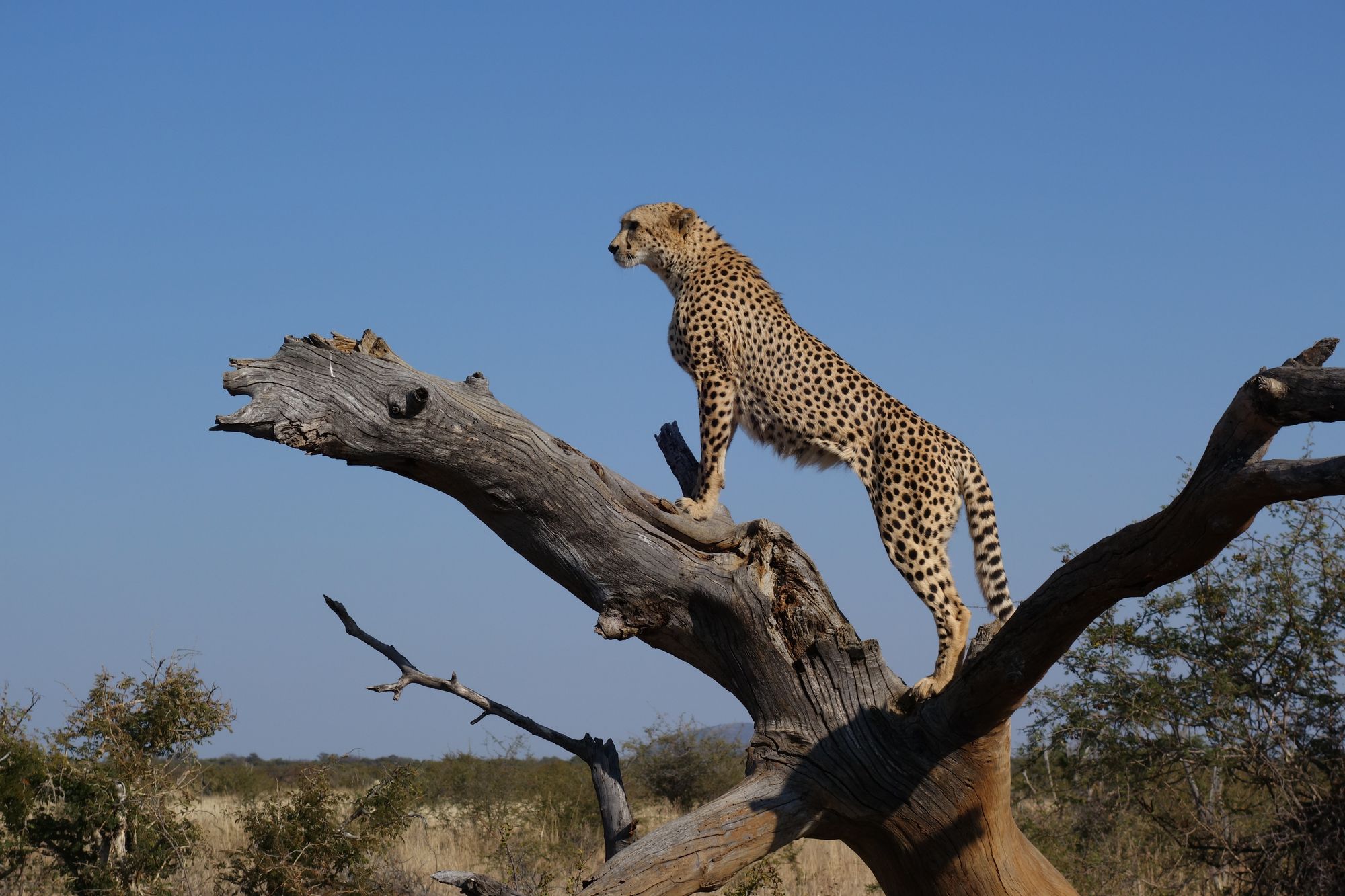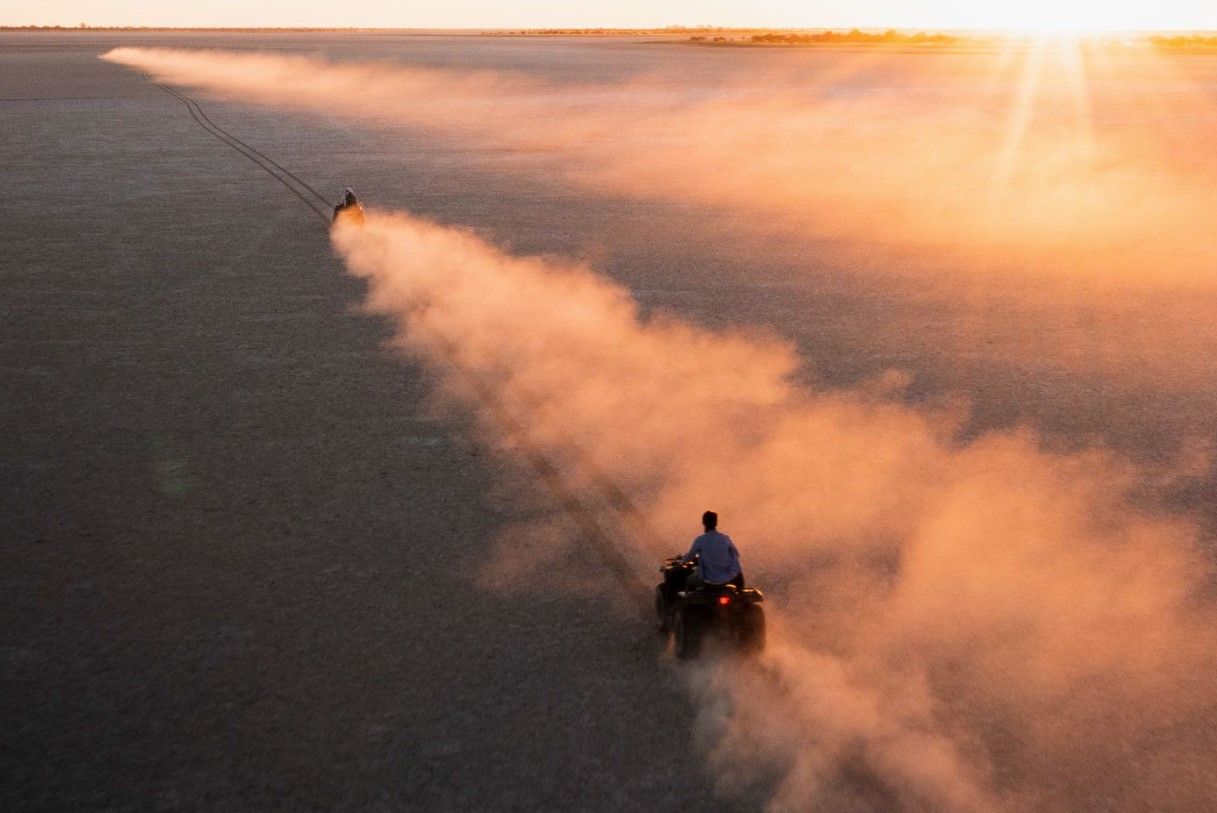From who controls the K-pop market to rewilding India with cheetahs – Here's your February 20 news briefing
Previously, there were three major entertainment agencies in South Korea – JYP, YG Entertainment and SM Entertainment.

A few minutes every morning is all you need.
Stay up to date on the world's Headlines and Human Stories. It's fun, it's factual, it's fluff-free.
To start off, we're looking into:
The K-pop world is consolidating
The backstory: Previously, there were three major entertainment agencies in South Korea – JYP, YG Entertainment and SM Entertainment – the group behind big Korean names like Girls' Generation. But then BTS exploded in fame and popularity. So when the heartthrobs grew to become the top-selling artist in the world by 2022, the entertainment company behind the group – Hybe – also became an industry leader in the world of K-pop.
More recently: Meanwhile at SM Entertainment, the founder, Lee Soo-man, has been dealing with drama with his shareholders. More recently, Lee has been trying to block a deal between his own company and Kakao, which operates the country's largest social media and messaging platform. The deal would've made Kakao the second-largest SM Entertainment shareholder, decreasing Lee's control. Many also believe this is Kakao's first step toward eventually buying the whole company.
The thing is, though, if Kakao goes into this business, it will threaten Hybe's position in the K-pop world. Plus, Hybe really needs to expand its portfolio since its main moneymaker BTS is on hiatus to complete mandatory Korean military service until 2025.
The development: With that, Hybe's jumping in, recently buying 15% of its local rival SM Entertainment. Hybe has also offered to buy another 25%, bringing its total ownership of SM Entertainment to 40% plus control of the company. The entire deal has been valued at US$900 million and has caught the attention of the country's antitrust regulators.
Terra’s Do Kwon is wanted

The backstory: Enter Do Kwon, the brains behind Terra and cryptocurrency TerraUSD, aka UST. In 2020, he came up with this stablecoin that promised to keep a 1-to-1 peg to the US dollar using some fancy algorithm and a sister token called Luna. Although UST was pegged to the dollar, the market set Luna's value. So if the price of UST went above US$1, there was an incentive to trade Luna for it at a profit. This meant the two coins could be interchanged to keep UST's value and circulation steady.
More recently: But, things didn't go according to plan, and both tokens took a nose-dive in May 2022. It's a classic case of if one falls, the other follows. On top of that, Kwon is now a wanted man in South Korea for his involvement in the TerraUSD mess and potentially breaking capital-markets law.
The development: Now, Kwon and Terraform Labs (Terra's parent company) have been charged with fraud by the US Securities and Exchange Commission (SEC) for allegedly selling unregistered securities, including the TerraUSD stablecoin, and using shady tactics that erased billions in market value. It's also been said that Kwon and his team lied to investors about TerraUSD's stability and its connection to the South Korean mobile payment app, "Chai." Kwon has denied any wrongdoing on social media, and his whereabouts are unknown for now, although he's believed to be hiding out in Serbia or a nearby country.
The Munich Security Conference

The backstory: The Munich Security Conference, aka "Davos of Defense," takes place every year. From every (habited) continent come dozens of world leaders, generals, security experts and officials and diplomats to Germany for the three-day conference. Since the war in Ukraine started last year, the conflict has been expected to set the stage for this year's event. For the first time since the 90s, Russia didn't get an invite to the conference. The Iranian government also wasn't offered seats. Instead, opposition and exiled figures from those countries were invited.
The development: There were a few highlights at this year's Munich Security Conference. Ukrainian President Volodymyr Zelenskiy opened with a warning against war "fatigue" and also urging speed in Ukraine's fight against Russia's latest offensive. US Vice President Kamala Harris also spoke, accusing Russia of crimes against humanity in Ukraine. Chinese diplomat Wang Yi called for peace talks between Russia and Ukraine.
Additionally, an agreement was made for Europe to provide Ukraine with more weapons. German Defense Minister Boris Pistorius pushed for higher military spending for Europe and NATO. Outside of the conference, demonstrators gathered in anti-war protests. But, a pro-Ukraine rally was also held, calling for more military aid and support in Ukraine.
To end, we'll look into:
Rewilding India

About 70 years ago, cheetahs disappeared from India’s wildlife because of human development and hunting. Cheetahs used to live in many regions where they can’t be found anymore, like the Middle East and central India. Now, India is ready to start bringing them back, rewilding nature with cheetahs. The plan is to slowly reintroduce cheetahs by flying a few in at a time from Africa, releasing them into national parks after keeping them in quarantine for a month.
“The cheetah is a magnificent animal, it’s a big magnet for ecotourism,” says Yadvendradev Jhala, dean of the Wildlife Institute of India. “If you bring in cheetah, the government will put funds into rehabilitating and rewilding these systems, and all the biodiversity will thrive.”
The process is on its second leg, with 12 cheetahs being sent over from South Africa this weekend. They’ll be brought to Kuno National Park, joining the first eight cheetahs that were relocated there last year. From now on, India plans on relocating 12 cheetahs a year to continue with its plan.
“When the cheetah will run again … grasslands will be restored, biodiversity will increase and ecotourism will get a boost,” said Prime Minister Narendra Modi when the first eight cheetahs were released in India.
These 12 cheetahs are wild-born, so they understand which predators to look out for and how to survive in areas like this. Unfortunately, even in sub-Saharan Africa, there aren’t many wild cheetahs left – only around 7,000, actually. With cheetah populations declining everywhere in the world except for South Africa, many experts hope India will offer the right space for building up cheetah populations.
But some aren’t so sure. There can be “cascading and unintended consequences” when a new animal enters an ecosystem, said Mayukh Chatterjee of the International Union for Conservation of Nature. In the past, a tiger population boom in India has created conflict with people as they try to share the same space. Rewilding cheetahs leads to questions about how they’ll interact with other animals, like hyenas, or prey, like birds.
In other news ...
♥Rescue efforts wind down in Turkey: It’s been almost two weeks since that massive earthquake and its aftershocks hit Turkey and Syria. Now, Turkey has ended rescue efforts everywhere except in two provinces: Kahramanmaras and Hatay. Tens of thousands of people have been found dead, but survivors are also still being found.
💣North Korean missile tests: Over the past year, North Korea has conducted military and missile tests close to South Korea and its coast. On Saturday, North Korea launched an intercontinental ballistic missile (ICBM) test to boost its nuclear attack capacity against its rivals. It also threatened more steps in response to upcoming military training between the US and South Korea.
💣Israeli missile hits Damascus: In the past few months, Israel has been carrying out more airstrikes in Syria, especially against Iranian weapon transfers. On Sunday, an Israeli rocket strike hit a building in Damascus, Syria’s capital. The strike killed five people and damaged buildings nearby.
❓Will China provide aid to Russia? Apart from calling for peace talks between Russia and Ukraine, China has largely stayed out of the war in Ukraine so far. But, according to the US Secretary of State Antony Blinken, China is thinking about giving Russia military aid with weapons and ammunition. He also warned that this move could have some major consequences.
👋Israeli diplomat removed: Right now, the annual African Union summit is taking place in Ethiopia. An Israeli diplomat was just removed from the summit because she isn’t the accredited ambassador to Ethiopia, and that’s the official who was expected to come. She was asked to leave because the invitation was non-transferable.
💲Meta testing subscription: A couple of months ago, Twitter created a subscription service (Twitter Blue) for users to get a verified check mark. Now, Meta is looking to test its own subscription service, Meta Verified, for US$11.99 a month. This will also be a way for users to create verified accounts and get blue badges, allegedly for helping content creators grow.
🐤Twitter to charge for two-factor authentication: Twitter users can verify their login with several two-factor authentication methods, including an SMS text message. But, on Friday, Twitter announced that this SMS 2FA had been abused in the past and would be available only for Blue subscribers starting March 20.
😎New emojis coming: New emojis incoming! With the iOS 16.4 update, Apple users will have 31 new emojis added to their keyboards. These include emojis like a “shook” face, several new animals (yay to the donkey!) and a pink heart.
🚚A new kind of safari: Leading safari organizer Natural Selection is creating a unique safari in Botswana – one where animals aren’t the attraction. Instead, tourists ride ATVs across Botswana’s largely empty and lifeless interior stretch over a primordial lake bed far from the noise and lights of any civilization.

🎮Super Nintendo World: The first Super Nintendo World outside of Japan is finally open! On February 17, California welcomed Mario, Luigi and more to the new theme park at Universal Studios Hollywood. It will also feature a new augmented reality ride, “Mario Kart: Bowser’s Challenge.”

🐶Dog carnival: Every year, Rio de Janeiro in Brazil hosts its Carnival in the days leading up to the Catholic holiday of Lent. Differently-themed street parties, or “blocos,” draw big crowds. On Saturday, we got to see a dog costume competition bloco with over 100 dogs dressed up for the occasion.

Written and put together by Joey Fung, Vanessa Wolosz, Shebby Farooq and Christine Dulion




Comments ()